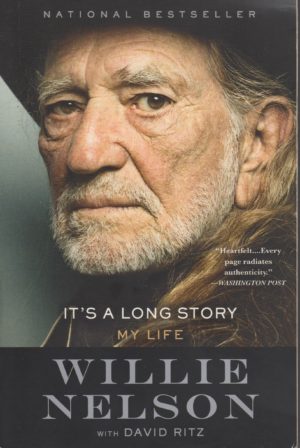
It’s a Long Life by Willie Nelson with David Ritz (2015. Back Bay Books. ISBN 978-0-316-40354-2)
This isn’t great literature. It’s the personal history of 20th century pop and country and blues culture centered around one of the greatest singer/songwriters of our generation. It isn’t epic or especially well-written. The language is plain and at times, a bit forced in terms of its folksy charm. There are some scene switches and editing glitches (maybe Willie will use that line in a song someday!) that grate and make one reassess just how entertaining this book is. And while the author proposes to “come clean” about his life in terms of his three failed marriages, his troubled youth, his pot use, and his problems with the IRS, there’s not a whole heck of a lot of personal revelation here that hasn’t been examined in other articles and books about Nelson. And yet:
I loved the book.
Sort of like Willie’s whiny, thin voice, I can’t really explain it.
But here’s a passage dealing with a court case involving the Highwaymen, Willie, Johnny Cash, Kris Kristopherson, and Waylon Jennings, when they were sued by a 1960s one-hit-wonder band, the original Highwaymen, for name appropriation. Judge Stephen S. Trott was one of the original band members, a federal district court judge, and the plaintiff in the civil lawsuit against the “real” Highwaymen.
“Your honor, I can only imagine the anger and dismay of the audience when, instead of seeing Judge Stephen S. Trott and his four associates take the stage, the fans see Willie, Waylon, Johnny, and Kris. I’d venture to say we’re even running the risk of a riot”…The judge got a kick Goldberg’s (Nelson’s lawyer’s) sarcasm and seemed ready to dismiss the case against us. I felt sorry for the original Highwaymen, though, and came up with an idea. I asked my partners whether they’d go along with my plan. “What do you have in mind?” asked Waylon. “Let’s get the original Highwaymen to open up for us at the Astrodome.” Waylon laughed. So did Johnny and Kris. The rodeo fans got to hear “Michael Row the Boat Ashore,” and everyone lived happily ever after.
That passage paints a fairly accurate picture of literary voice and the type of humor Nelson relies upon to tell his story and that tone and tenor suits the old cowboy just fine. But to me, as a struggling regional author, a writer who waits for accolades from readers and critics, the authorial approach that hits closest to home for me is the depiction of Nelson’s drive, his determination, to make his art his way. The story of Willie’s struggle to be true to himself and his muse, well that, to me is the real story here, with all its flaws, warts, and imperfections. These snippets of wisdom are valuable reminders that even the best artists run long and taxing races before they cross the finish line in glory. In this vein, Nelson’s depiction of his interaction with a Columbia Records executive about the content and styling of one of his greatest albums, Red Headed Stranger, is illuminating and positively inspiring. The executive hated the rough, raw, outlaw sound of the tapes Nelson tossed on his desk. But he’d been savvy enough to construct his contract to give one person creative control of his art: Willie Nelson. And that person believed in Willie Nelson. The rest is history.
A fun, quick read that has its pluses and minuses but, overall, paints a portrait of an American original that sings (pun intended!).
4 stars out of 5.
Peace.
Mark


